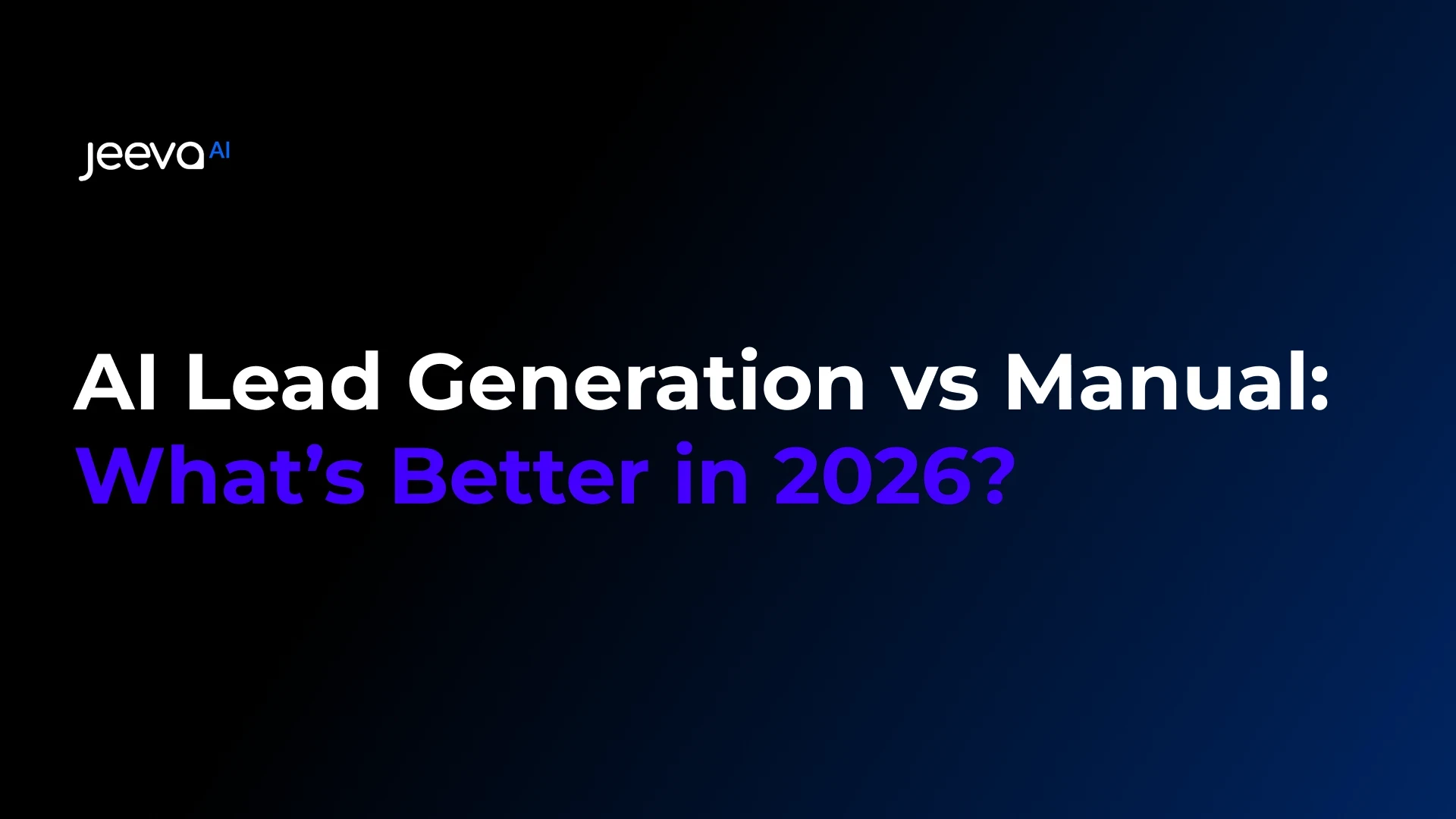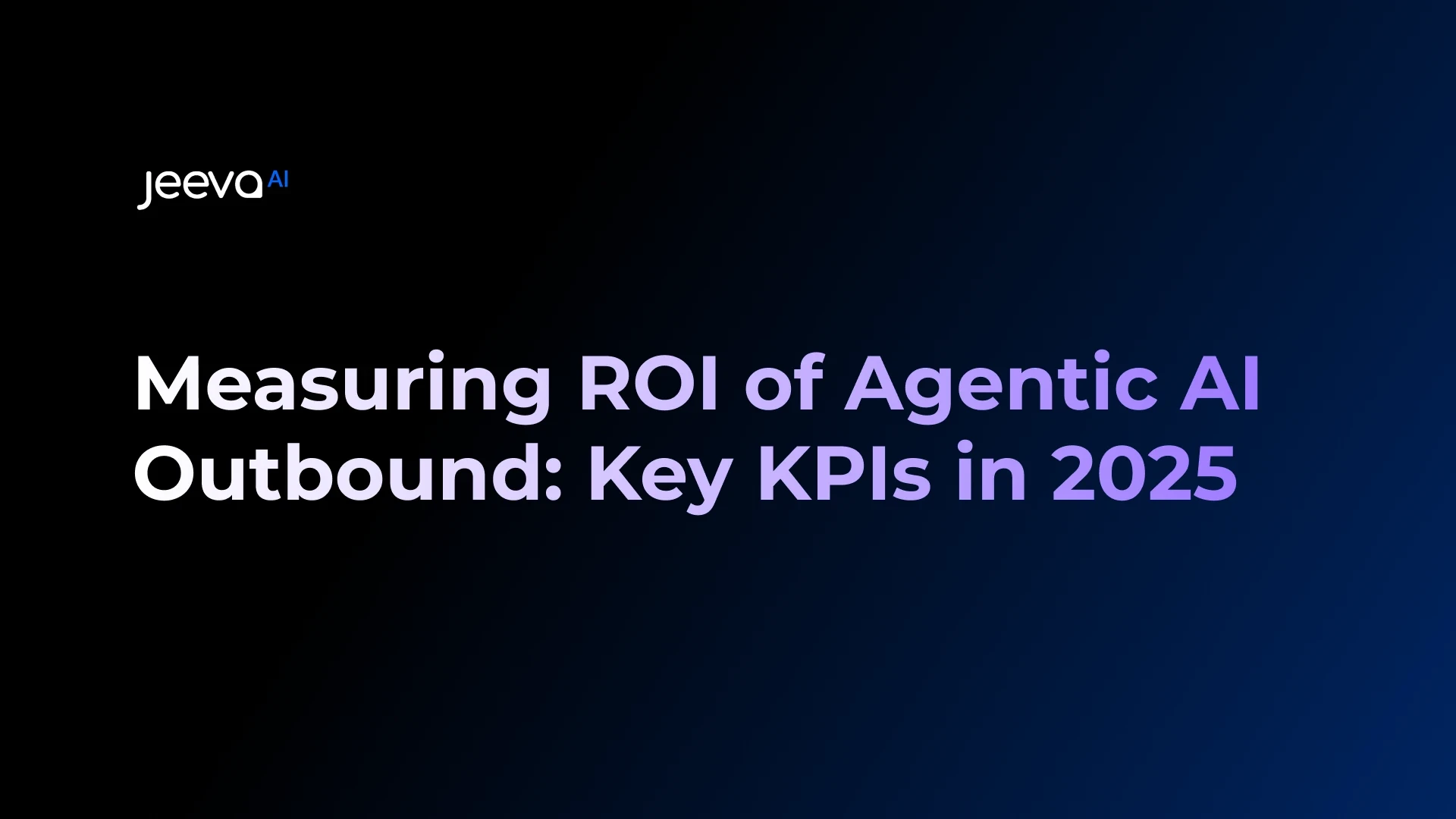Introduction: The Evolution of Inbox Automation in 2025
Inbox automation in 2025 uses artificial intelligence (AI) to automatically sort, prioritize, and respond to emails - helping professionals save time, reduce clutter, and focus on high-value conversations.
Every day, business users face overflowing inboxes - from client messages and meeting invites to lead notifications and newsletters. Traditional filters and folders no longer cut it. AI inbox automation tools now go beyond rule-based sorting; they understand context, detect urgency, and even compose replies.
Whether you’re a Gmail or Outlook user, modern automation tools like Jeeva Smart Inbox AI can instantly identify intent (sales, support, or spam), assign ownership, sync with your CRM, and draft replies with human-like accuracy.
In 2025, inbox management has shifted from manual to intelligent - and your email is finally working for you, not against you.
Why Inbox Automation Matters in 2025?
Inbox automation matters in 2025 because it eliminates repetitive email tasks using AI - sorting, prioritizing, and responding automatically to improve productivity.
With professionals receiving over 120+ emails per day, automation ensures you never miss critical messages. Tools powered by AI inbox management now understand context, sentiment, and urgency - helping you focus on revenue-generating conversations instead of manual sorting.
Key Benefits of Inbox Automation in 2025:
Reduces inbox overload
Saves 3–5 hours weekly per user
Ensures faster response time
Increases productivity and focus
In 2025, inbox automation isn’t optional - it’s essential for staying ahead.
Top Inbox Automation Tools for Gmail Users
Gmail automation tools are now more intelligent, integrating AI, filters, and workflow automation.
Jeeva Smart Inbox AI
Best For: Founders and teams managing multiple sales or support inboxes.
Why It Stands Out: Jeeva’s Smart Inbox Agent uses Agentic AI reasoning to identify intent (lead, demo, spam, follow-up) and auto-routes messages to the right workflow.
Key Features:
Lead intent detection
Follow-up automation
CRM integration (HubSpot, Zoho, Salesforce)
Auto-labeling & smart folder creation
Pros: Context-aware replies, zero manual sorting, unified inbox for Gmail + Outlook.
Cons: None — best suited for business use.
👉 Explore Jeeva Smart Inbox AI
Clean Email
Best For: Individual users who want to declutter Gmail.
Pros: Groups similar emails, auto-unsubscribes from spam, creates Smart Folders.
Cons: Limited team features.
Mailstrom
Best For: Bulk cleanup and inbox organization.
Pros: Powerful filters and bulk unsubscribe.
Cons: Lacks AI-driven prioritization.
Zapier Gmail Integration
Best For: Automating repetitive Gmail actions.
Pros: Custom rules for sending, archiving, or forwarding emails.
Cons: Setup can be complex for non-technical users.
How to Choose the Right Inbox Automation Tool
Before subscribing, compare tools using these key filters:
Compatibility: Does it work with your email client (Gmail, Outlook, or both)?
Automation depth: Does it offer AI-based learning or just rule-based sorting?
Security & privacy: Check encryption and data usage policies.
Ease of setup: Can non-tech users automate without coding?
Support & integration: Look for Slack, Notion, or CRM integration.
➡️ Pro Tip: Start with a free trial - AI automation behaves differently depending on your email volume and usage pattern.
Best Email Automation Tools for Outlook in 2025
Outlook continues to dominate corporate email - and now supports AI-powered automation integrations.
1. Jeeva Smart Inbox AI (Outlook Edition)
Best For: Teams using Microsoft 365 for sales and communication.
Why It’s Great: Automatically detects buyer intent, routes emails, and drafts replies using AI.
Pros: Works natively inside Outlook UI, integrates with Teams + CRM, supports multilingual contexts.
Cons: Business-tier pricing only.
2. Microsoft Copilot for Outlook
Best For: Enterprise users seeking AI-assisted responses.
Pros: Summarizes threads, drafts follow-ups, and schedules tasks.
Cons: Available only on Microsoft 365 plans.
3. Boomerang for Outlook
Best For: Professionals who need email scheduling and reminders.
Pros: Sends later, follow-up nudges, AI “Respondable” score.
Cons: Lacks full inbox automation capabilities.
How AI Is Changing the Future of Inbox Management
AI is redefining inbox management by introducing automation that understands context, intent, and tone.
Modern AI email automation uses natural language processing (NLP) to:
Prioritize important emails based on sender and urgency
Generate smart summaries for long threads
Suggest reply templates based on tone and behavior
Sync conversations with CRMs for sales visibility
Example:
Jeeva.AI’s Smart Inbox Agent recognizes a “Demo Request” email → categorizes it under “High Intent” → syncs it with CRM → triggers automatic follow-up.
AI turns your inbox into a living assistant - not a digital dumping ground.
Smart Features to Look for in Inbox Automation Tools
When evaluating smart inbox tools, look for features that combine convenience, reasoning, and integration.
Must-Have Features:
Auto-categorization: Sorts sales, support, and marketing emails automatically.
Intent Recognition: Detects buyer interest and urgency.
CRM & Calendar Integration: Syncs with existing tools.
AI Reply Suggestions: Drafts and personalizes responses.
Task Automation: Converts emails into actionable tasks.
Team Collaboration: Shared inbox view and tagging.
Data Privacy & Security: End-to-end encryption and GDPR compliance.
💡 If it doesn’t think for you - it’s not truly AI inbox automation.
How to Automate Your Inbox for Maximum Productivity
Step-by-Step Process to automate your Inbox
Choose a Tool: Select one that integrates with your email client (e.g., Jeeva.AI, Zapier, Clean Email).
Define Rules: Automate sorting, follow-ups, and labeling.
Integrate CRM: Sync lead emails to avoid manual entry.
Enable AI Summaries: Let AI condense long conversations.
Set Smart Reminders: Never forget follow-ups.
Pro Tip:
Combine AI tools like Jeeva Smart Inbox + Calendly to automate email → follow-up → meeting scheduling in one flow.
Know More : About Smart Inbox Manager
Top AI Inbox Automation Tools for Gmail & Outlook in 2025
If your inbox feels like a full-time job, these AI-powered inbox automation tools can help you reclaim hours of lost productivity. Each tool combines automation, reasoning, and collaboration features that make email management effortless in 2025.
Tool | Best For | Key Feature |
|---|---|---|
Jeeva Smart Inbox AI | B2B teams & founders | Agentic AI that auto-sorts, replies, and routes leads; integrates with Gmail, Outlook, HubSpot & Salesforce |
Superhuman | Power users | AI triage, keyboard shortcuts & real-time prioritization |
Clean Email | Inbox cleanup | Smart filters, bulk deletion & one-click unsubscribe |
Boomerang | Scheduling | AI-powered reminders, send-later features & follow-up automation |
Missive | Teams | Shared inbox, team tagging & workflow automation |
Flowrite | Replies | Generates natural, AI-written email responses instantly |
Pro Tip: Pair Jeeva Smart Inbox AI (for intent-based automation) with a writing enhancer like Flowrite to achieve full-scale AI inbox automation - intelligent sorting, instant follow-ups, and human-like communication across Gmail and Outlook.
Inbox automation : Smart Inbox By Jeeva
Inbox Automation vs Email Management Tools: What’s the Difference?
Aspect | Inbox Automation | Email Management |
|---|---|---|
Focus | Automates tasks like sorting, replying, and routing | Helps organize and categorize manually |
Technology | AI and NLP-based | Rule-based or manual |
Use Case | Workflow automation for teams | Inbox organization for individuals |
Examples | Jeeva.AI, Superhuman, Front | Gmail filters, Outlook folders |
Inbox automation works for you; email management works with you.
Common Mistakes to Avoid When Automating Your Inbox
1. Over-Automation: Relying entirely on automation can cause missed nuance. Review critical conversations manually.
2. Ignoring Privacy Settings: Ensure compliance with GDPR and enterprise data policies.
3. Not Training the AI: AI gets smarter over time - correct misclassifications early to improve accuracy.
4. Skipping CRM Sync: Disconnected automation leads to lost data and misaligned pipelines.
5. Using Multiple Overlapping Tools: Consolidate into one system like Jeeva.AI for better orchestration.
💡 Automation amplifies both efficiency and mistakes - set it up wisely.
Click Now: AI powered conversation
10. Final Thoughts: Make Your Inbox Work Smarter, Not Harder
In 2025, inbox automation tools have evolved from simple filters to intelligent systems that understand your workflow.
Whether you use Gmail or Outlook, AI-driven platforms like Jeeva Smart Inbox AI redefine productivity by combining reasoning, personalization, and automation.
Instead of managing hundreds of emails daily, let AI prioritize, route, and even respond - freeing you to focus on strategy and growth.
Turn your inbox into a growth engine - not a bottleneck.
Try Jeeva Smart Inbox AI | Book a Demo
FAQs on Inbox Automation Tools (2025)
1. What is inbox automation?
Inbox automation is the process of using AI and rules to automatically organize, prioritize, and respond to emails. It helps reduce clutter, streamline workflows, and ensure that high-priority messages receive attention instantly.
2. Why is inbox automation important in 2025?
In 2025, professionals receive hundreds of emails daily. Inbox automation tools powered by AI save time by sorting, labeling, and drafting replies automatically - improving productivity and ensuring critical messages are never missed.
3. Which are the best inbox automation tools for Gmail?
The best Gmail automation tools include Jeeva Smart Inbox AI, Clean Email, and Mailstrom. Jeeva stands out for its reasoning-based automation that identifies lead intent, syncs with CRMs, and generates personalized responses in real time.
4. What are the best Outlook email automation tools?
Top Outlook automation tools in 2025 include Jeeva Smart Inbox AI, Microsoft Copilot for Outlook, and Boomerang. Jeeva’s Outlook integration offers AI-driven email categorization, meeting scheduling, and follow-up automation directly inside Microsoft 365.
5. How does AI improve inbox management?
AI improves inbox management by detecting patterns, understanding message context, and generating intelligent actions like auto-replies, prioritization, and lead routing - all based on user behavior and historical communication.
6. What features should I look for in smart inbox tools?
Look for auto-categorization, AI response suggestions, CRM integration, intent detection, and real-time collaboration. These features help teams stay organized and automate repetitive email tasks.
7. How do I automate my Gmail or Outlook inbox?
You can automate your inbox by connecting tools like Jeeva Smart Inbox AI or Zapier. Define rules to label emails, set auto-responses, schedule follow-ups, and sync lead data with your CRM for seamless automation.





